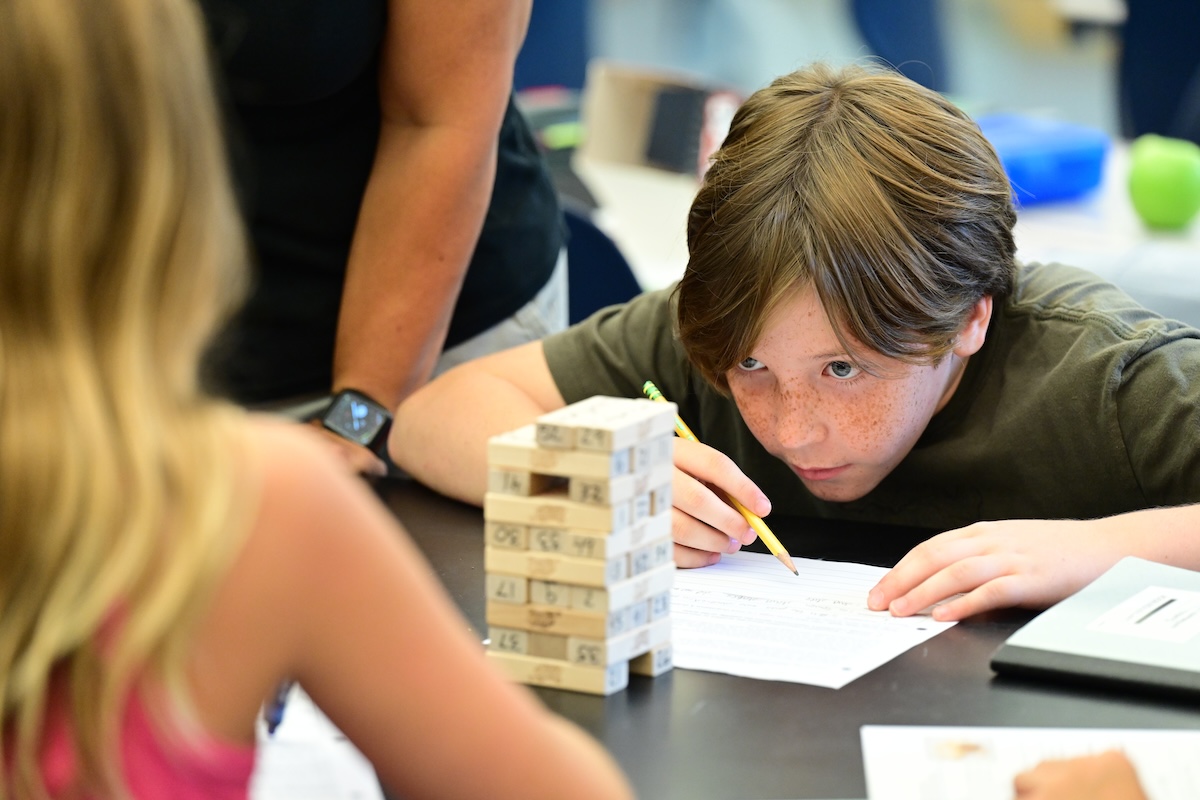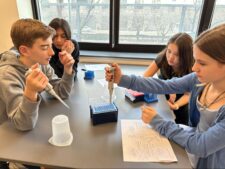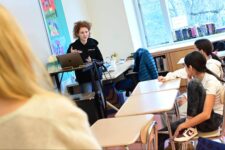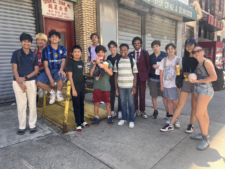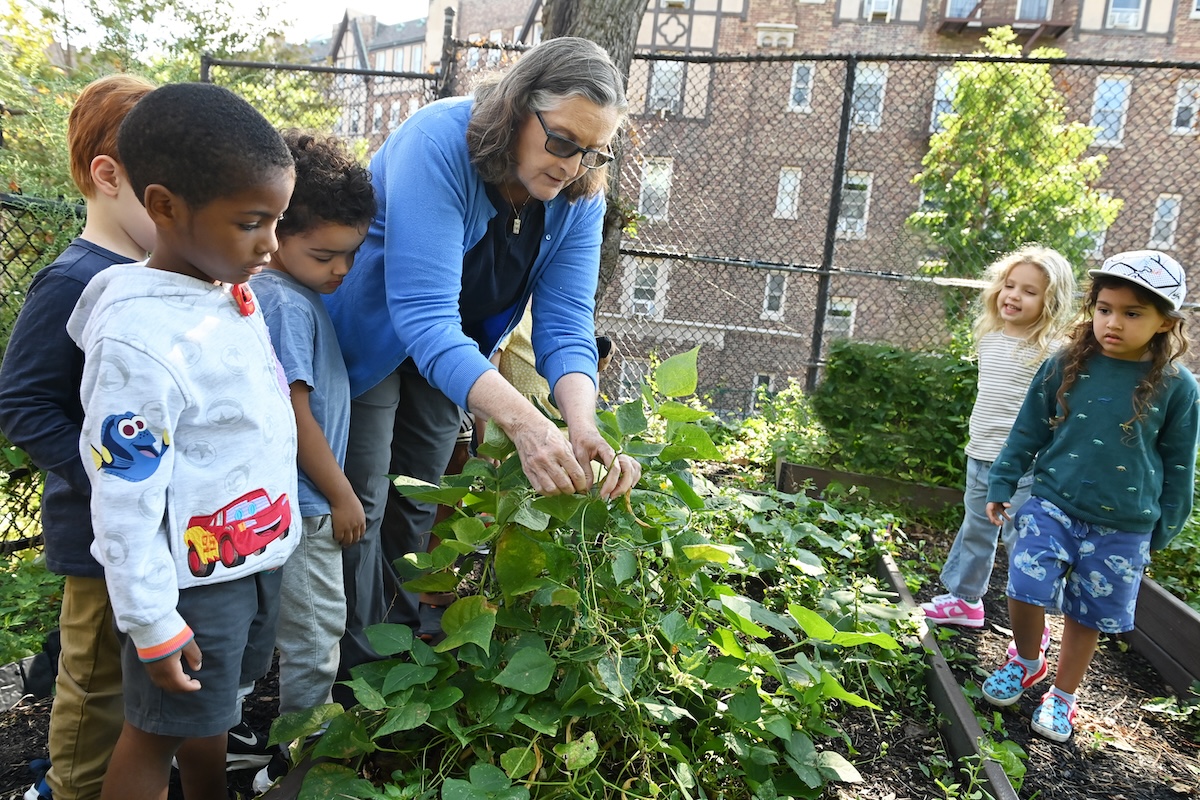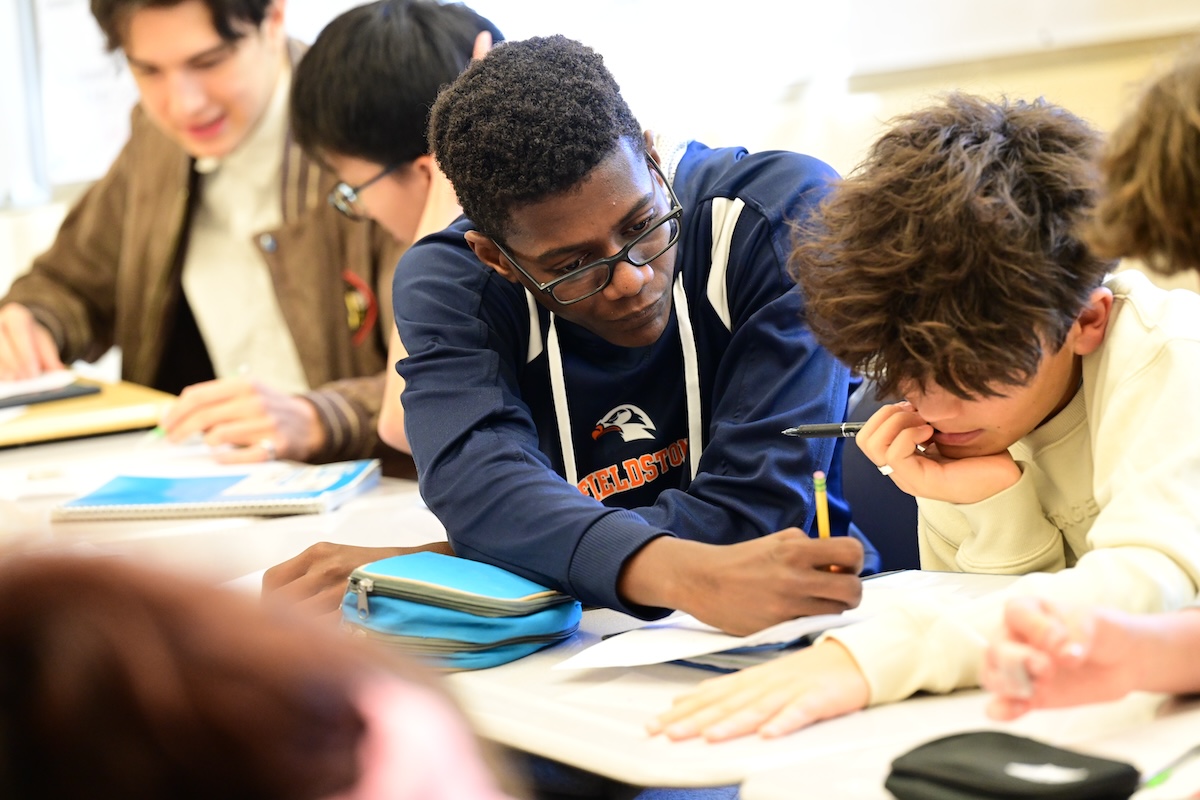Expanding knowledge and intellectual independence
6th–8th Grade: Bronx Campus
Fieldston Middle provides a supportive and challenging environment where students develop intellectual independence, ethical awareness, and social-emotional maturity. Academic rigor and exploratory opportunities prepare students for Fieldston Upper and beyond.
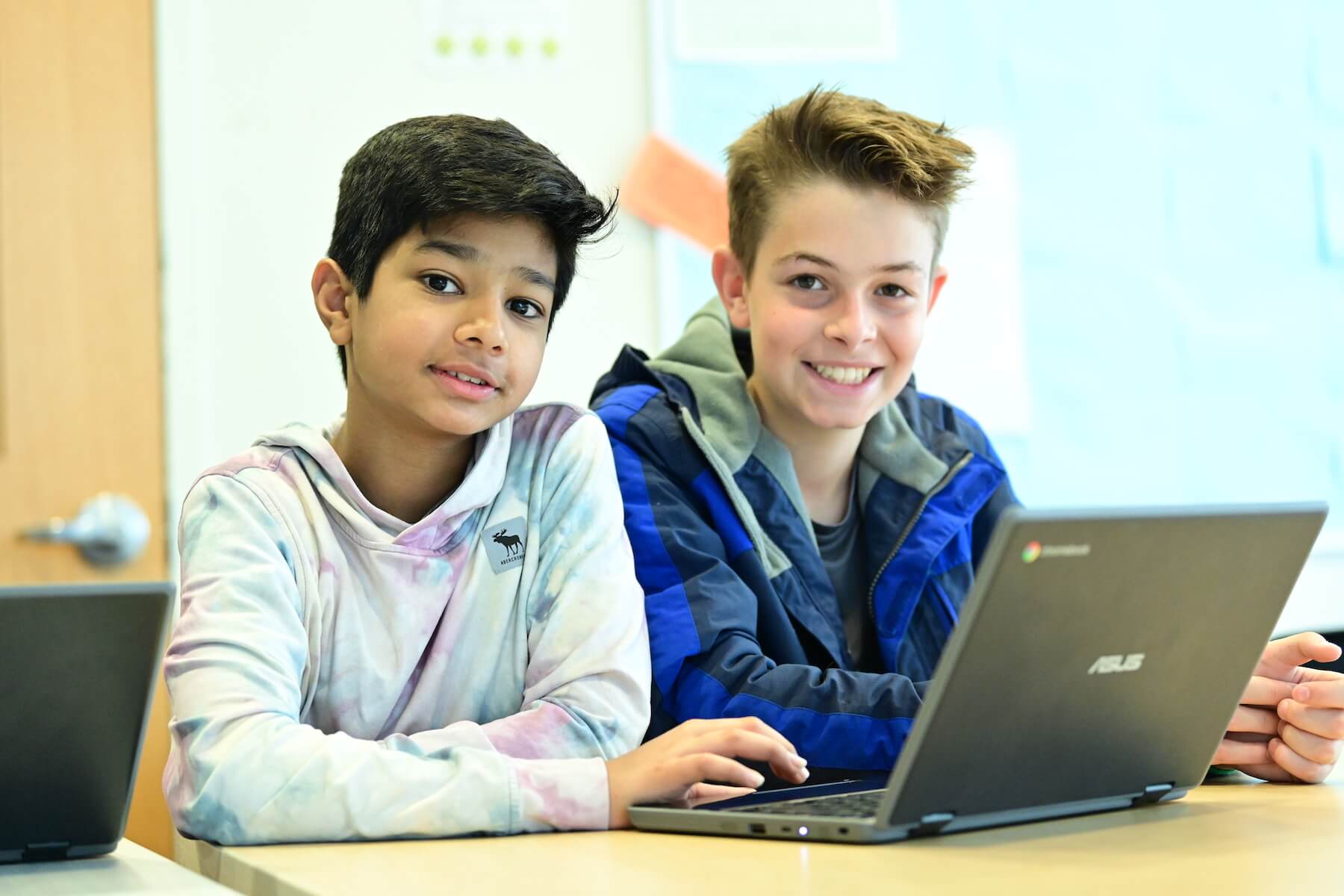
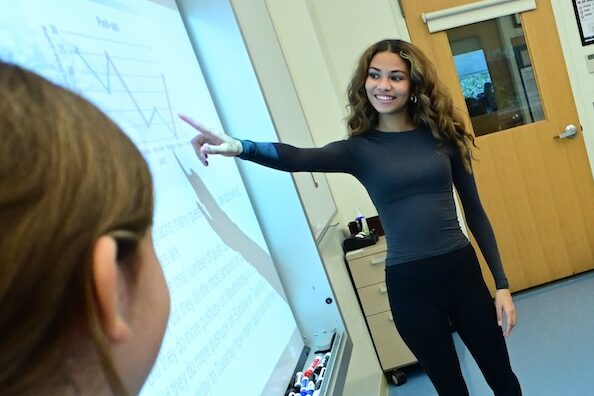

Education is the means of awakening the moral sense, the social sense, and the intelligence of the child. — Felix Adler
Applying the Pillars of Our Mission
The Pillars of our Mission guide every aspect of curriculum design and development, ensuring a shared philosophy and seamless alignment across disciplines and divisions. At Fieldston Middle, our program:
Academic Excellence
- Rigorous, project-based, and interdisciplinary curriculum across humanities, mathematics, sciences, engineering, and world languages
- Elective courses allow exploration of emerging interests and talents
- Students develop analytical thinking, communication, and collaborative problem-solving skills
Progressive Education
- Project-based and inquiry-driven learning encourages critical thinking
- Service learning connects classroom knowledge with real-world impact
- Collaborative, hands-on projects foster the development of innovation and the practical application of ideas
Ethical Learning
- Advisory and Community Conversations programs promote identity development, a sense of belonging, and ethical decision-making
- Ethics is integrated into the daily curriculum, encouraging thoughtful reflection and community engagement
- Leadership and collaborative opportunities strengthen responsibility and citizenship
Curriculum
Drawing inspiration from New York City, Fieldston Middle’s rigorous academic program embraces forward-thinking and diverse practices, responding to the nuances of adolescence. Teachers collaborate to integrate curriculum across subjects, focusing on inclusion, ethics, and equity. Students further develop critical-thinking skills, social-emotional capacities, and a joy of learning while growing as active community leaders. We encourage you to watch the video for a glimpse into life at Fieldston Middle. For department overviews, please read below.
English
English
English in the middle grades cultivates passionate readers and writers who use language to think critically and communicate with purpose. Students read widely to explore diverse perspectives, analyze how authors use point of view and style, and support their ideas with evidence. Writing is both a craft and a means of discovery — students learn to organize and refine their work for clarity and impact, using literary models to guide their growth. Grammar and vocabulary are taught in context, while technology supports revision and collaboration. Over time, students develop independence, fluency, and voice, seeing themselves as readers, writers, and ethical participants in the world.
Ethics
Ethics
The Ethics program helps students develop self-awareness, empathy, and integrity as they navigate identity, relationships, and community. In 6th Grade, students focus on building healthy self-concepts and communication skills through class discussions and the student-to-student peer mentorship program (STS), which fosters cooperation and conflict resolution. In 7th Grade, they explore identity, inclusivity, and justice, examining how personal and social factors shape experience and belonging. By 8th Grade, students apply these insights to real-life ethical dilemmas, strengthening their capacity for empathy, mindfulness, and responsible decision-making. Across all grades, Ethics empowers students to act with compassion and integrity within their communities and the wider world.
History
History
History at Fieldston Middle helps students understand how the past shapes the present and equips them with the tools to think critically about the world around them. Over three years — Ancient History in 6th Grade, World Geography in 7th Grade, and American History in 8th Grade — students learn that history is not just facts and dates but a story of people, ideas, and systems that continue to influence our lives. They analyze primary and secondary sources, develop research and writing skills, and use evidence to support their arguments. As students progress, they move from guided inquiry to independent research, crafting thesis statements, essays, and presentations that connect historical study to ethical questions. By the end of middle school, students think historically, communicate effectively, and recognize the power of understanding the past to shape a more just and informed future.
Language
Language
The Languages program inspires students to become confident communicators and curious global citizens through the study of Mandarin Chinese, French, Spanish, or Latin. In 6th Grade, students rotate through all four languages, exploring their sounds, structures, and cultures while building foundational study skills and cultural awareness. At the end of the year, each student selects one language to pursue more deeply. In 7th Grade, language study becomes immersive, with students practicing speaking, listening, reading, and writing while exploring the traditions and perspectives of their chosen language. They expand vocabulary, develop grammatical accuracy, and engage in creative projects that connect language learning to real-world contexts. By 8th Grade, students communicate with increasing fluency, discussing personal and global topics, comparing cultural perspectives, and using the target language to express ideas. Whether studying a modern or classical language, students leave Middle School with a strong linguistic foundation, empathy, and the confidence to communicate across cultures.
The Learning Center
The Learning Center
An integral part of Fieldston Middle, the Learning Center supports all students with learning differences through a variety of approaches, including classroom support, small-group instruction, and one-on-one guidance. Students are also encouraged to meet with their teachers as needed to ensure academic success.Beyond direct student support, the Learning Center serves as a resource for faculty, administrators, parents/guardians, and the broader ECFS community.
The Center’s services include collaborating with faculty and administrators on classroom strategies, coordinating with school psychologists and outside tutors, working with the Learning Styles Committee, communicating evaluation results and accommodations to teachers, and serving as a liaison for students requiring test accommodations.
Math
Math
In 6th Grade math, students build a foundation in integers, fractions, decimals, ratios, and proportions through hands-on projects such as stock market simulations. In 7th Grade, they transition to algebra, exploring variables, equations, exponents, ratios, and percent, applying concepts to real-world problems such as voting methods. By 8th Grade, students deepen their algebraic understanding with multi-step and linear equations, systems, polynomials, and radicals, using graphing and data analysis to connect math to real-life contexts like mortgages and interest rates. Across all grades, instruction emphasizes problem-solving, collaboration, and sound mathematical reasoning, preparing students to approach complex problems with insight and integrity.
Music
Music
In 6th Grade, students begin learning an instrument or voice, develop music-reading skills in all twelve keys, and acquire foundational knowledge of tone production, posture, and basic theory while participating in band, strings, or chorus. In 7th Grade, students expand their skills, performing more advanced repertoire, mastering major and minor key signatures, and gaining independence through solos and more complex ensemble work. By 8th Grade, students prepare for the Fieldston Upper music programs, tackling challenging compositions, joining Jazz Band or the Fieldston Upper ensembles, and experiencing newly commissioned works. Across all grades, instruction emphasizes collaboration, discipline, and creative expression, ensuring students develop both technical proficiency and a lifelong love of music.
Physical Education
Physical Education
The Physical Education and Athletics program fosters skill development, teamwork, and lifelong fitness while emphasizing empathy, kindness, and well-being. Students participate in a wide range of sports — including soccer, basketball, volleyball, swimming, track and field, and more — through coeducational and intramural play, with classes emphasizing personal fitness, tactical understanding, and cooperative competition. 6th Grade students engage in PE four times a week, while 7th and 8th Grade students meet daily, with swimming required for all students. Many practices occur during the school day, allowing students to participate in club and travel teams after school. Middle School interscholastic sports — offered across fall, winter, and spring — are developmental, ensuring meaningful playing time, teaching game fundamentals, and promoting sportsmanship, while balancing inclusivity and student safety.
Science
Science
In 6th Grade science, students study environmental science and engineering, conducting fieldwork on campus and exploring sustainability, environmental justice, and the engineering design process. In 7th Grade, students focus on life science, investigating organisms, homeostasis, heredity, evolution, and the human body while developing skills in observation, data collection, and scientific communication. 8th Grade science deepens understanding of physical science and chemistry, exploring Newtonian mechanics, energy, matter, and atomic interactions. 7th and 8th Grade students also have the opportunity to take engineering elective courses, which provide project-based experiences, from building robotic models to designing 3D-printed creations, emphasizing creative problem-solving, precision, and teamwork. Across all grades, students engage in hands-on labs, research, interdisciplinary projects, and discussions that foster scientific literacy, ethical reflection, and an appreciation for diverse contributors to scientific knowledge.
Theatre and Dance
Theatre and Dance
Fieldston Middle’s Theatre and Dance department offers a rich program for students to explore acting, dance, choreography, and production through four- or eight-week rotations. Each year, 6th Grade students perform a musical, while 7th and 8th Graders stage a dramatic play, with past productions including Charlie and the Chocolate Factory, Once Upon a Mattress, Mary Poppins, and more. Early grades build foundational skills in Project Arts, Acting I, and Dance I, focusing on improvisation, character creation, choreography, and ensemble performance. As students advance, they tackle monologues, scene study, dance improvisation, original choreography, and backstage roles such as directing, stage management, and technical design. 8th Grade courses are specialized and responsive, including acting, dance, playwriting, directing, and media projects like dance video, helping students refine technique, collaborate creatively, and integrate multiple disciplines.
Visual Arts
Visual Arts
The Visual Arts program allows students to explore a wide range of media and creative processes while building technical skills and personal expression. In 6th Grade, students develop foundational skills, experiment with materials, and learn to give and receive feedback. In 7th Grade, students follow a set rotation of Visual Arts, Model Building, and other arts courses like Graphic Communications, exploring two- and three-dimensional projects. By 8th Grade, students choose from courses including Digital Art, Drawing and Painting, Printmaking, Photography, Film Lab, Sculpture, and Ceramics, meeting three times per week in eight-week Across all grades, the program emphasizes experimentation, critique, and self-directed learning, giving students increasing freedom to prepare for Fieldston Upper, where they can pursue a visual arts major.
Middle School Admissions
The principles of our mission extend to our Admissions Office, which places each of our applicants, from 6th Grade through 8th Grade, at the center of our admissions process. This informs all of the careful considerations we make when meeting and getting to know prospective students and families.
